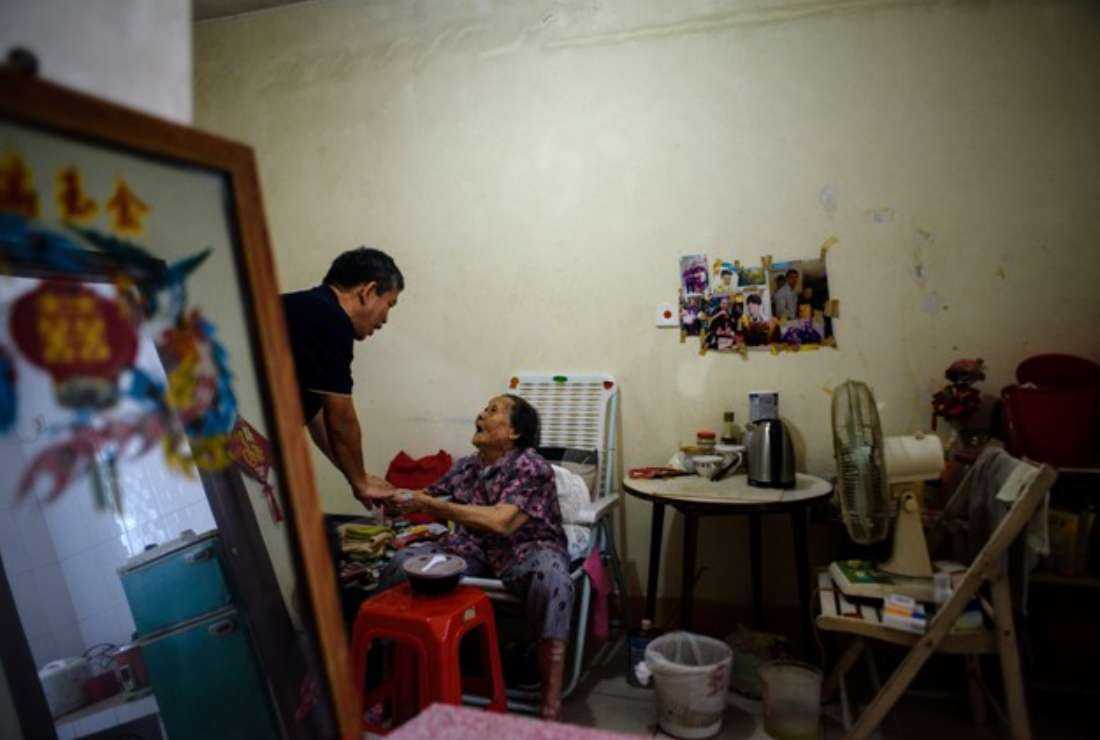
University of St. Joseph joins global project aiming to address food insecurity in Portuguese-speaking territories

In this picture taken on Aug. 29, 2017, Chan Lai (center), who is in her mid-80s, thanks Paul Pun, who heads the Macau branch of global charity Caritas, after he gave her a food box in her flat in Macau. (Photo: AFP)
The Church-run University of St. Joseph (USJ) in Macau has joined a global radio project that aims to combat hunger and food insecurity through multidisciplinary analysis by experts and knowledge sharing in Portuguese-speaking countries and territories.
The USJ has partnered with the University of São Paulo (USP) of Brazil in a pioneering Portuguese-language web radio project to combat hunger and food insecurity, Macau’s Portuguese Catholic weekly, Jornal O-Clarim, reported on Feb. 10.
Adérito Fernandes Marcos, an academic responsible for coordinating USJ's participation in the Portuguese language project said that the Faculty of Arts and Humanities which focuses on the field of media communication would create content specific to Macau.
“Concerning Macau, what we propose to do is verify, deepen, study, and apply different media resources to address the issue of food safety,” he said.
The initiative aims to study how they could “expand knowledge” on food security and hunger and “make it reach and be understandable to the general population,” Marcos said.
Coordinated by Dirce Maria Lobo Marchioni, a renowned nutritionist and academic researcher from the USP, the project proposes to address not only hunger and food security that affect even developed nations but also other issues such as access to nutrients or food waste problems.
“Today, the issue is not limited to hunger as a lack of basic food, a glaring problem in the poorest countries and territories in the world, but also to issues of health and nutrition, food security or food waste,” Marcos said.
The universities of Toronto, Newcastle, Lisbon, and Porto are also involved in this international project.
The project coordinated by around a dozen other higher education institutions in Brazil, and in other nations aims to bring together academics and experts on five major thematic axes — Health and Nutrition, Public Policies, Value Chains, Artificial Intelligence, and Communication.
Due to its global scope, the project aims to use Artificial Intelligence to analyze data and provide sustainable models of production and consumption which can aid in the eradication of hunger.
“Artificial Intelligence will allow the extraction of knowledge and learning for effective decision support in solving real problems in the supply of basic foodstuffs, waste management, promotion of food safety and nutrition, in all its dimensions,” Marcos said.
The global project will connect radio stations run by students and teachers and shall focus on Angola, Cape Verde, Guinea-Bissau, Mozambique, São Tomé and Príncipe in Africa, East Timor and Macau in Asia, Brazil, and Portugal — all Portuguese-speaking countries.
As the radio project progresses, the USJ aims to develop a virtual museum that explores the cultural and gastronomic diversity of Macau, through audiovisual records.
“With the eventual integration into this project, the establishment of a new multi and transdisciplinary line of research in the area of the biographical narrative is foreseen, taking Macau as a multicultural epistemological reference,” Marcos said.
Macau, a former Portuguese colony, saw a rise in unemployment during the Covid-19 pandemic, soaring to 3.7 percent in 2021, according to official data. The rate dipped slightly to 3.5 percent in 2022.
However, the Catholic Church and NGOs continue to support the unemployed and low-income families through its Food Bank and other initiatives.
The Food Bank caters to the people through weekly food baskets among other benefits with additional support from the Social Action Institute of Macau diocese.
The weekly food basket distributed by Caritas Macau includes pasta, rice, cooking oil, and biscuits. In addition to this, the Social Action Institute distributes powdered milk to applicants who have young children in their care.
In May 2022, Caritas Macau reached out to hundreds of unemployed non-resident workers and provided each with 20-30 patacas (US$3.71-4.94) per day with donations from benefactors.
Macau is a Special Administrative Region of China. It has an estimated population of 700,000 in an area of about 30 square kilometers, including some 30,000 Catholics in nine parishes.
Help us keep UCA News independent
The Church in Asia needs objective and independent journalism to speak the truth about the Church and the state.
With a network of professionally qualified journalists and editors across Asia, UCA News is just about meeting that need. But professionalism does not come cheap. We depend on you, our readers, to help maintain our independence and seek that truth.
A small donation of US$2 a month would make a big difference in our quest to achieve our goal.

Share your comments